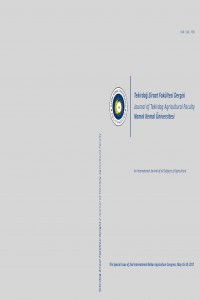Çeşitli Kuraklık Stresi Koşullarında Ekmeklik Buğday Genotiplerinin Verim ve Verim Bileşenleri İçin StabiliteParametreleri
Abstract
Kuraklık ana abiyotik stres faktörüdür ve tahıl dolumu süresince düşük yağış ekmek buğday verimini ve verim unsurunu etkilemektedir.
Keywords
References
- Blum, A. 1988. Plant breeding for stress environments. CRC Press, Boca Raton, FL, 38–78.
- Blum, A. 1996. Yield potential and drought resistance: are they mutually exclusive? In:Reynolds M.P., Rajaram S., Mc Nab A. (Eds.) Increasing yield potential in wheat. Breaking the barriers, 90–101.
- Clarke, J.M., R.M. De Pauw and T.F. Townley-Smith, 1992. Evaluation of methods for quantification of drought tolerance in wheat. Crop Science 32, 423–428.
- Eberhart, S.A. and W.A Russell, 1966. Stability parameters for comparing varieties. Crop. Sci.6: 36-40.
- Finlay, K.W. and G.N. Wilkinson, 1963. The Analysis of Adaptation in a Plant Breeding Programme. Aust. J. Agric.Res., 14: 742-754.
Stability Parameters for Yield and Yield Component of the Bread Wheat Genotypes under Various Drought Stress Condition
Abstract
Drought is the main abiotic stress factor and low rainfall during grain filling period affect bread wheat yield and yield component. This experiment was carried out in the experimental field of Trakya ARI, Edirne (Turkey), in 2008-2009 and 2009-2010 years. Totally, 15 genotypes were planted in RCBD in a split-plot with three replications. The main plots were assigned to five moisture regimes, which included 3 drought stress environments, one non-stress and one non-treatment environment. Droughts were created under mobile rain shelter at various plant growth stages from shooting up to maturating stage. Stability parameters were determined for grain yield, biological yield, harvest index, spike number per square meter, kernel and spikelet number per spike were investigated. A joint regression analysis was applied to grain yield and other yield component to estimate the stability parameters; mean yield (x),
determinations coefficient (R2), regression coefficient (b), deviation from regression coefficient (S2d), and intercept
value (a). The highest yield (658.3 kg/da) was determined in Bereket and biological yield (2539.4 kg/da) in Kate A-1 cultivar. The highest grain and biological yield was obtained under non-stress condition. For grain yield, it was determined that Kate A-1 and BBVD7 were adapted to well environmental conditions, Bereket was well adapted to all environment condition. For biological yield Pehlivan, BBVD7 and Bereket were well adapted to all environmental conditions. Wide range of stability statistics was determined among cultivars for all the parameters. Gelibolu and Bereket were the stable cultivars on the basis of overall mean yield and stability parameters.
Keywords
References
- Blum, A. 1988. Plant breeding for stress environments. CRC Press, Boca Raton, FL, 38–78.
- Blum, A. 1996. Yield potential and drought resistance: are they mutually exclusive? In:Reynolds M.P., Rajaram S., Mc Nab A. (Eds.) Increasing yield potential in wheat. Breaking the barriers, 90–101.
- Clarke, J.M., R.M. De Pauw and T.F. Townley-Smith, 1992. Evaluation of methods for quantification of drought tolerance in wheat. Crop Science 32, 423–428.
- Eberhart, S.A. and W.A Russell, 1966. Stability parameters for comparing varieties. Crop. Sci.6: 36-40.
- Finlay, K.W. and G.N. Wilkinson, 1963. The Analysis of Adaptation in a Plant Breeding Programme. Aust. J. Agric.Res., 14: 742-754.
Details
| Journal Section | Articles |
|---|---|
| Authors | |
| Publication Date | September 19, 2017 |
| Submission Date | August 29, 2017 |
| Published in Issue | Year 2017 JOTAF / JOURNAL OF TEKIRDAG AGRICULTURAL FACULTY |

